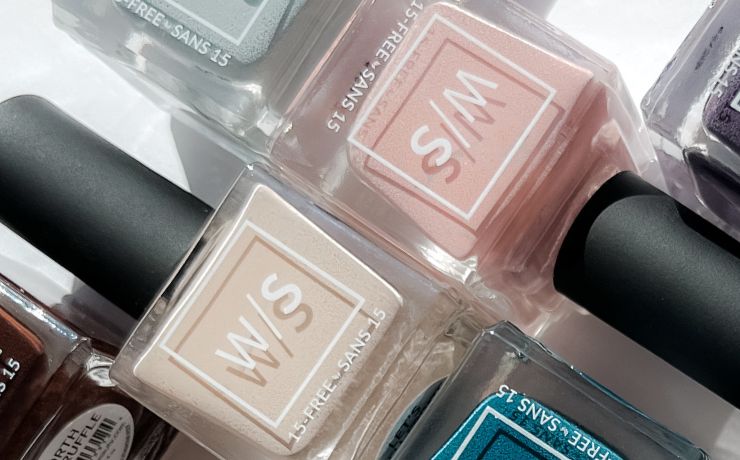withSimplicity | August 28, 2024
Back to School Skincare Guide for Teens

Helping your teen feel confident in their own skin is a top priority this fall. Introducing healthy beauty habits can significantly boost their self-esteem. This back-to-school makeup and skin care guide is designed to help you navigate this stage with your adolescent. Discover advice on establishing healthy teen skin care habits, age-appropriate makeup products and other tips to help your child look and feel their best this school year.
What Can Happen to the Skin During Puberty?
Puberty can bring changes to the skin. You may have noticed your teen dealing with breakouts and patches. Explore the common skin issues your child may face during this phase.
Acne
Acne affects 85% of adolescents, making it the most common skin issue. Hormonal changes trigger oil glands to produce more sebum, which can clog pores and ultimately result in acne. Blackheads, whiteheads, pimples and cystic acne may occur during this phase.
Aside from hormonal changes, some factors can trigger acne formation:
- Beauty products: Your teen’s skincare and makeup products might worsen their acne condition. Be careful of comedogenic products, which increase the risk of acne formation.
- Genetics: If your teen suffers from moderate to severe acne, they may have inherited it from one of their parents.
- Diet: Foods that can cause higher blood sugar levels, such as white bread and cornflakes, may contribute to acne.
- Endocrine disorders: Women with endocrine issues, such as polycystic ovary syndrome (PCOS), have higher androgen levels, which may trigger breakouts.
Increased Oil Production
The sebaceous (oil) glands in the skin become more active, producing more sebum. This can make the skin appear oilier, especially on the face, chest, and back.
It's extremely important that you get your teen started on a consistent skincare regimen to help them with all the skin changes.
Can Skin Conditions Affect a Teen’s Physical and Mental Health?
The above skin issues, although common, can affect your teen’s mental health. According to research, acne can lead to psychological distress among adolescents. The visible nature of acne, eczema and other issues can make teens feel judged by others, leading to lower self-esteem.
That might be why this generation's teens wear makeup to cover up their skin issues. A study showed that 79% of parents say their children 12 and older use cosmetics. While makeup is a great tool for self-expression and creativity, makeup for preteens can have harmful ingredients.
For instance, heavy metals such as cadmium, lead and chromium have been found in children’s face paints and even everyday makeup products. Endocrine disruptors such as parabens, phthalates and perfluorochemicals (PFCs) are also evident in adult makeup. Phthalate exposure may affect reproductive health among male and female teens by affecting estrogen and androgen production.
Make sure to check out our blog post about the harmful affects of fragrance (phthalates) in cosmetics.
How to Introduce Your Teen to Natural Skin Care & Makeup
When it's time to go back to school, you'll also want to look into your teen's hygeiene/beauty products in addition to all the notebooks, pencils, and tissue boxes on your list.
Know Their Skin Type
When it comes to teen skin care, less is more. The first thing to do is to understand your child’s skin type. Here are the four main skin types:
- Dry skin: Your teen has dry skin if it feels tight, flaky, dull and rough. The key to caring for this skin type is to provide hydration.
- Combination skin: In teens with combination skin, some areas may appear oily while others may feel dry.
- Oily skin: A greasy, shiny skin may mean your teen has oily skin. This type is more prone to large pores, pimples and blackheads.
- Sensitive skin: Adolescents with sensitive skin may become irritated and inflamed when exposed to specific products and environmental factors. It’s crucial to choose gentle, all-natural products to minimize potential irritations.
Introduce them to a Simple Skincare Routine
If you’re looking for skincare and makeup for preteens, consider giving your teen a three-step skincare routine, which includes a gentle face wash, toner, and a light moisturizer to boost hydration. Our foaming Face Washfor Acne Prone Skin will help reduce blackheads and blemishes, which are common teen skin concerns.
Here’s a step-by-step guide to a simple, preteen skincare routine:
- Cleanse: Use the foaming cleanser twice daily — every morning and evening. This step will prepare the skin for the next steps of their skincare routine.
- Use a toner: A toner made with natural ingredients helps soothe and calm the skin. It also removes dirt, controls excess oil production, and balances the skin's pH levels.
- Moisturize: A moisturizer will help protect your teen’s skin from losing moisture, keeping it plump and glowy. Our Face Jelly moisturizer contains ingredients, such as blue tansy oil and aloe vera, that nourish the skin without the greasy feeling, making it ideal for teens with oily and sensitive skin.
Promote the Use of Sunscreen
Advise your teen to wear sunscreen daily. It’s one of the best mom tips and lessons you can give your child. While avoiding the sun is impossible, prolonged exposure may lead to skin discomfort, including sunburn. Pick a sunscreen with at least SPF 30 and teach the importance of reapplication, especially during outdoor activities
Incorporate sunscreen into part of your teen’s morning skincare routine. Choose a non-comedogenic, sustainable sunscreen to protect your child’s face and the environment.
Give your Teen Resources on How to Apply Makeup
Consider investing in a clean makeup starter kit when shopping for teen makeup products. For example, our starter kits consist of natural cosmetics, including liquid foundation, cream concealer, mascara, lip gloss, tri-stick and pressed eyeshadow. These essential makeup products are enough to let your child experiment with different school-appropriate looks.
Teach your daughter to go for a more natural look. Remind them that makeup enhances their features, not change their appearance, especially in school. Go for a more natural look that embraces her natural beauty.
If you need help introducing your teen/pre-teen to makeup, you are always welcome to reach out to us or stop by our shop and we'll help you both every step of the way!
Practice Mindful Social Media Consumption
Consuming online skincare content on Instagram and TikTok can trigger unhealthy habits among the youth. With thousands of beauty hacks and tips, your child may feel pressured to buy trendy products and do DIY skincare trends. It’s your responsibility to ensure your child remains confident about their appearance despite the trends and filtered content online.
... and no, your 13-year-old does not need anti-aging products that contain retinol. These products will actually harm their skin.
More Skincare Tips for Teens
These healthy habits can help make your teen look and feel beautiful this back-to-school season.
- Hydrate: Encourage your child to stay hydrated all day. Give them a reusable water bottle to make drinking more accessible. Discuss the importance of hydration with them — share that it can help promote better skin by supporting collagen production inside the body, leading to a clearer complexion. It can also help boost their energy levels, helping them become more active in school activities.
- Avoid Touching Your Face: Encourage your teen to keep their hands off of their face. Each hand has around 10,000-10 million bacteria, which can cause acne when it comes in contact with pores. Highlight the importance of handwashing before applying skin care products to the face.
- Eat Healthy Foods: Prepare school meals and snacks rich in skin-boosting nutrients, such as salmon, beans, tomatoes and whole grains. Provide foods that contain omega-3s, lycopene and B vitamins to nourish your child’s skin and other bodily functions. Limit the intake of food sources rich in sugar, transfat and processed carbohydrates to reduce the risk of inflammation.
- Stay Active: Regular exercise helps increase blood flow, which improves skin moisture and appearance. Promote the importance of staying active to support growth and skin health. Encourage activities aligned with their interests to make exercise more enjoyable.
- Suggest Professional Help: Consider seeking professional advice if your teen’s skincare and makeup efforts aren’t providing them their much-needed confidence. If you sense skin problems are causing them distress, consult a dermatologist or esthetician who can provide your adolescent with tailored advice.
- Be Supportive: The best parenting advice for a parent of a teen is to be supportive no matter what. When your tween experiences a flare-up or struggles with putting on makeup, make sure to listen before speaking up. Discuss the ingredients of the makeup and skin care products they want to buy to ensure they’re making a sound decision.
The world of skincare and makeup can overwhelm your teen (and you). With these tips and your unending love, you can help your teen build a strong foundation for healthy skin and confidence!








